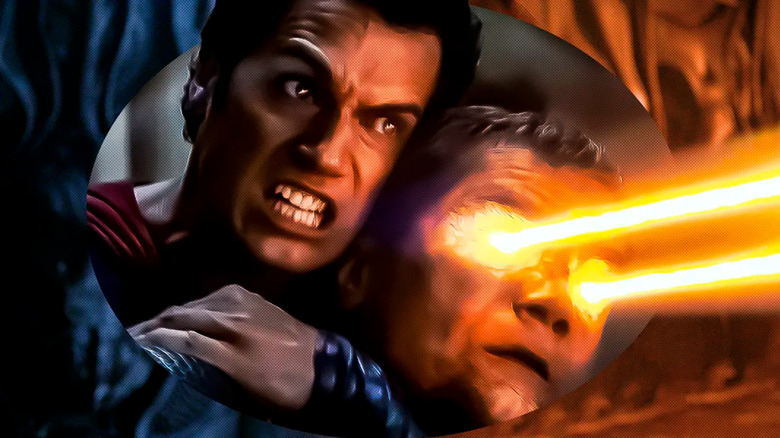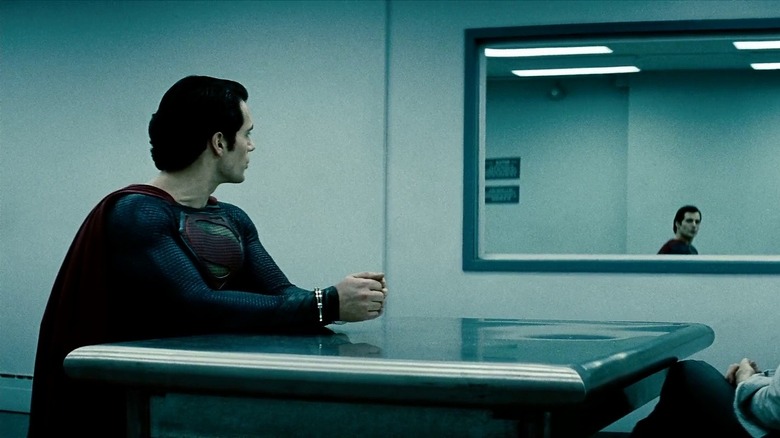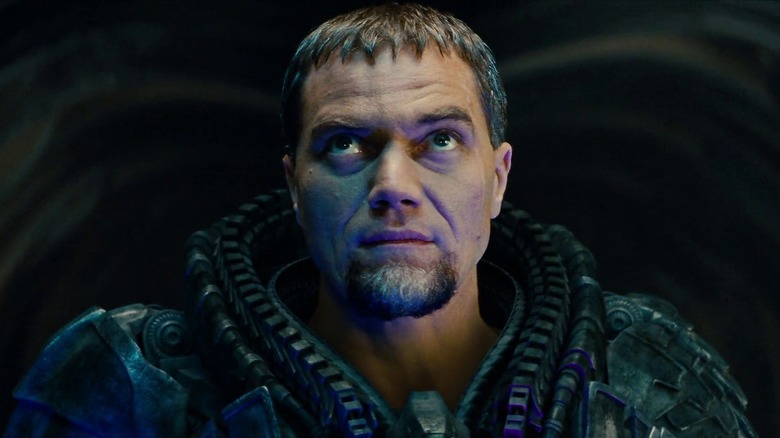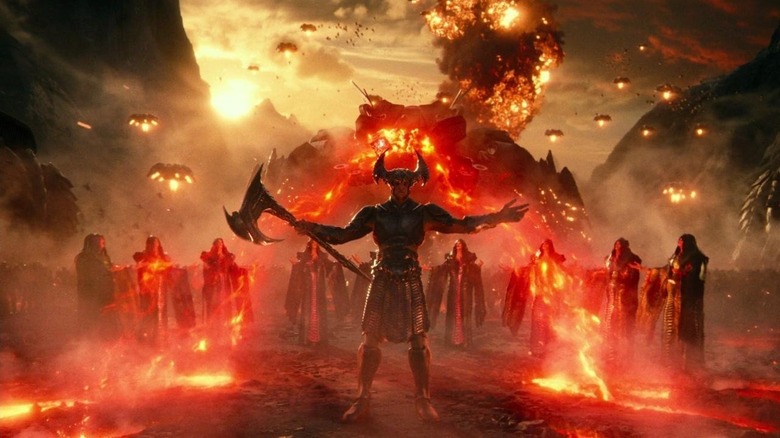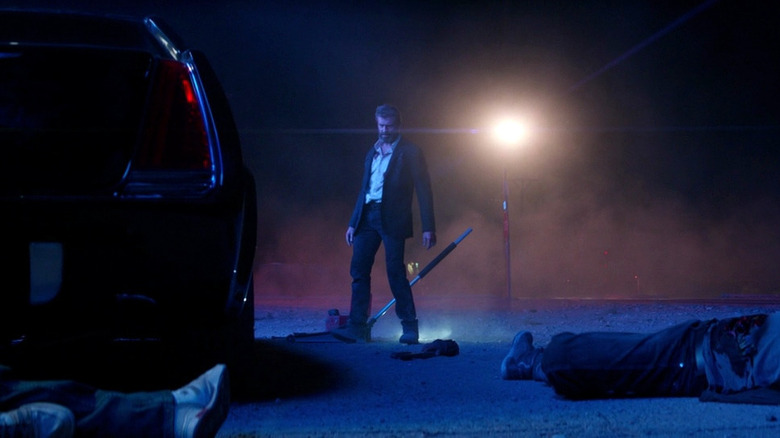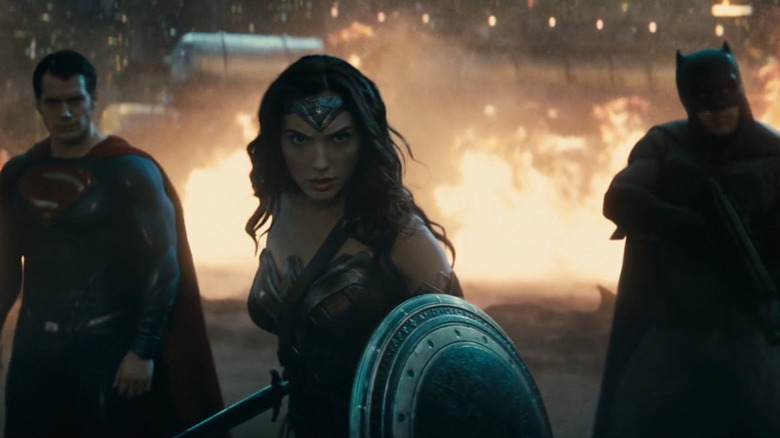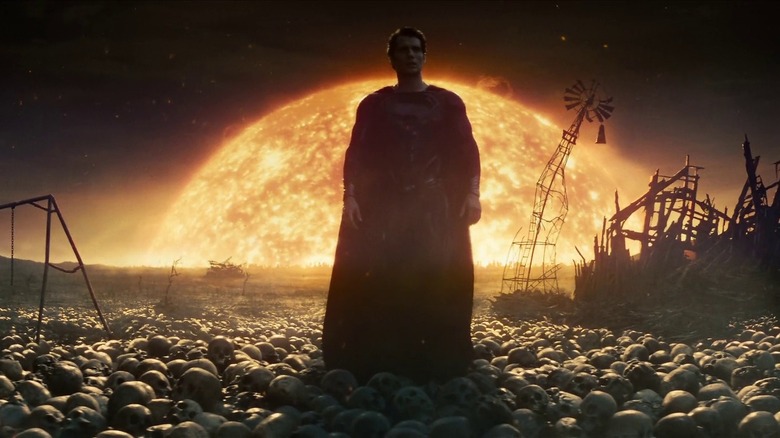Man Of Steel's Most Controversial Scene Was Also One Of The DCEU's Best Moments
Superheroes have been a fixture of pop culture for generations. However, while movie theaters are now filled with the tropes that once powered decades of four-colored pages, one particular fixture has, for the most part, been left behind: the no-kill rule.
Throughout a decent chunk of comics history, almost every major superhero had a moment (or many moments) where they would give a lecture on how heroes should never kill their opponents, whether it's a devious extraterrestrial mastermind like Brainiac in the pages of DC, or on the Marvel side, a symbiotic serial killer (turned mass murderer) like Carnage. Superman, as the so-called "boy scout" superhero, was long seen by fans as a hero who — even in the most dire circumstances — would never let even the most nefarious villain die on his watch, much less by his hands.
The comics, though, aren't as clear-cut about Superman's hesitancy to take lives as many would attest (see: 1988's Superman #22). While the "no-kill rule" and its flawed nature has been explored pretty deeply by Batman comics, to the point where it's now a huge part of Bruce Wayne's character, it's tended to be a bit more ambiguous for Superman. Furthermore, the inherent nature of Superman's power, as a paragon of moral goodness who must constantly hold himself back, means that it's arguably more interesting to see what happens when he does have to kill a supervillain to protect innocent life, instead of just protecting his goodness with plot armor.
This is why the death of Zod (Michael Shannon) in "Man of Steel" was not just great writing, but also the defining moment for Henry Cavill's Superman.
There are no restraints that can hold Superman or Zod
First, let's confront the elephant in the room: Why couldn't Superman just send Zod to prison?
In a simpler comic book story, sure, this would work. The entire point of "Man of Steel," though — and Zack Snyder's DCEU, which despite its various flaws, we're going to miss — was to shove a godlike character like Kal-El into a realistic world unprepared to deal with him. That means the DCEU, from the jump, has no magical prisons or Kryptonite containment cells. In other words, no cheat codes. And as we see in "Man of Steel," Superman can only be restrained when he allows himself to be. However, the moment he's finished with attempting to make peace with the United States government, Clark is easily able snap the handcuffs and escape from any place he is being contained.
This shows what a reasonable superhuman of this strength is capable of. Zod isn't reasonable. By the end of "Man of Steel," Zod is a man who has lost everything that matters to him and only exists now to pay back as much of his pain on Kal-El as he possibly can before he meets his end.
If the end of "Man of Steel" had seen Superman do the "no killing, never-ever" thing, Zod would've continued leveling cities and slaughtering millions. In-universe, if Superman knocked him out, what happens next? While the lengthy process of trying to imprison someone like Zod is calculated, Superman would need to be restraining him via chokehold 24/7.
Taking these matters into consideration, though the moment of Zod's execution served as a shock for fans, it was a necessary shock for the story Zack Snyder was telling.
The ethics of keeping General Zod alive are inherently complex
This isn't a debate about the death penalty or executions. A regular human being is, no matter how immoral, just a human being. Zod — and supervillains like him — is a near-omnipotent cosmic god with the possibility to blink his eyes and wipe out a city block. If this were real life, would anyone really want to keep him alive — to potentially go on yet another rampage?
By the end of "Man of Steel," Zod had already been responsible for an untold amount of death and destruction in Metropolis, and that's before he vows to Kal-El that he'll keep killing humans for as long as he breathes. In "The Lord of the Rings," King Theoden (Bernard Hill) says that "What can men do against such reckless hate?" — and the answer comes with the snap of Zod's neck, the same way as it came with an axe or sword through the head of an orc in J.R.R. Tolkien's epic fantasy saga.
You can't reform someone like Sauron or Zod, and letting them live just ensures that they'll have the chance to do something equally awful in the future, should they ever escape the chains that bind them. This is why Superman made the decision to kill Zod in that fateful moment.
For some reason, DC fans only cared about Zod's death, but not Steppenwolf or Parademons
Moviegoing audiences accept the notion that villains die at the end of the story, whether it's "Star Wars" or "Indiana Jones." The same holds true for superhero movies ... except for comic book sticklers, who hate when bad guys get killed off. However, this comes down to the natures of both mediums being different. Comic books are serialized narratives that need recurring villains. Movies are more isolated affairs, even when they're part of a series.
Furthermore, it seems like there's a double-standard here, because a lot of the same comic fans who hated Zod's death had no problem with the Justice League mowing down tons of Parademons like they were flies. And why does Superman not blink an eye when Wonder Woman chops off Steppenwolf's head? Because he's a dangerous, cosmic-level threat that couldn't possibly be contained. Now, there is the argument to be made that many audiences go to these kinds of movies to get away from the ugliness of the real world, a factor that might help to make sense of why such a large chunk of society rejected Zack Snyder's more grounded, morally compromised versions of their favorite DC heroes in his film adaptations. Still, to paraphrase Roger Ebert, if a filmmaker achieves what they set out to do, the film is ultimately a successful endeavor ... so long as the audience doesn't reject it.
Therein lies the disparity with "Man of Steel." Because while it was a huge controversy when Superman killed Zod, all his contemporaries in the MCU have been offing bad guys for a while.
Marvel heroes have largely already moved past the whole no-killing principle
Now, there are some superheroes that have always been known for killing bad guys, and Wolverine is tops in that list. That goes for both the comics and the movies, as seen in "X2: X-Men United" when Logan (Hugh Jackman) is there to skewer William Stryker's mutant-hating mercenaries on his claws in the defense of a school of children.
Even in the more lighthearted MCU, though, the most noble heroes aren't lecturing about why Nazis or super-powered serial killers need to be saved from the ledge at all costs. Captain America, as a literal World War II soldier, has killed many opponents onscreen. He clearly doesn't like it, but it's part of what he has to do if he wants to save the world. The same goes for Black Panther, Black Widow, Iron Man, and even Spider-Man, when you count all those Thanos minions in "Avengers: Endgame." Furthermore, the MCU doesn't breeze past the inherent complexity of this, but goes deep and analyzes the consequences of super-powered warfare and the loss of lives, as most potently seen in "Captain America: Civil War."
Now, Batman is supposed to be very black and white about the whole not killing thing — that's a big part of his character. The contradictions in him protecting life and protecting the Joker are supposed to uncomfortable. Superman, though, shouldn't just get off easy and not have to face ethical questions about the use of power. Until "Man of Steel," Superman was one of the last heroes to be faced with such a heavy decision, and it's why putting him in that impossible situation was such a stroke of brilliance — because seeing the superhero of superheroes get stuck in a "no other way" situation truly meant something.
Muddying the waters between good and evil is the whole point of Snyder's DCEU
The whole point of what Zack Snyder was going for when he was helming the biggest movies of the DCEU was that the real world is full of nuance, political turmoil, and situations that cannot be easily construed as merely black and white. While Richard Donner's Superman was a shining light and a paragon of virtue, Snyder's version of the character must make difficult and painful situations in order to be a paragon of virtue in a far less ideal world. Sometimes, that means morally gray choices.
Remember that Christopher Nolan was helping to build this new take on the character following his "Dark Knight" trilogy, a series of films that famously forced Batman to contend with similarly morally murky territory. In one film alone, we see Batman break international laws to bring a criminal to justice and enact surveillance upon everyone in Gotham City in order to find the Joker. Furthermore, "The Dark Knight," easily the most beloved of the three films, also sees Batman make the same choice as Superman in "Man of Steel" when he kills Two-Face in order to save the son of his best friend.
Now, you might recall that there was no massive societal debate about Batman, a character with a pronounced no-kill rule that is intrinsic to his ethos, killing his former ally during a desperate stand-off. With that in mind, ask yourself who was in a more desperate situation: Batman in "The Dark Knight" or Superman in "Man of Steel," who kills the only other remaining member of his entire birth culture, for the sake of his adopted world? Superman killing Zod isn't frivolous or grimdark. It's a deep character moment with consequences for his development.
A real-life Superman would be forced to make these kinds of decisions
"Man of Steel" is a film that, despite being about one of the most powerful heroes in history, seeks to ground him in a more realistic world. Snyder's film treats the audience with respect, asking them to put themselves in Superman's position, again and again, throughout the story.
To be crystal clear, Zod was focusing his laser beams on a nearby family in the moments before Superman executed him. To make matters even worse, Zod told Superman that he would never, ever stop trying to bring ruin to Earth. Taking these two factors into consideration, what would be the right thing for Superman to do in this morally complex situation?
The Man of Tomorrow really only had two choices during that key moment — he could kill Zod, or be implicit in the death of that family, and possibly millions of others. And sure, the scene didn't have to be written that way, but it was done so with clear intent, to paint Kal-El as a real human facing real challenges. And that's why this moment was such a masterstroke for a character like Superman. He could either allow innocent people to get barbequed by Zod while he opened a book on moral philosophy, or he could make the difficult decision to compromise his morals for the greater good, a decision that only he could make in that fraction of a moment. It's messy. It's complex. But that's life.
This grounding of one of the most omnipotent heroes in comic book history helps to set "Man of Steel" apart as one of the most iconic versions of Superman to date, and looking back, it's the scene that Cavill's Superman will always be remembered for.
